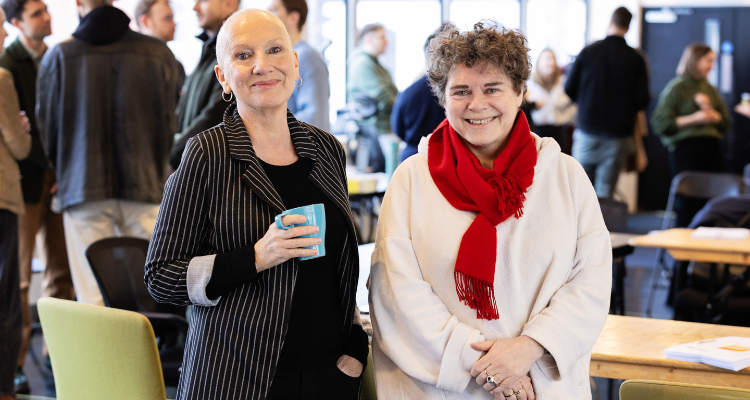‘Beauty always has an element of strangeness. I do not mean a deliberate cold form of strangeness, for in that case it would be a monstrous thing that had jumped the rails of life. But I do mean that it always contains a certain degree of strangeness, of simple, unintended, unconscious strangeness, and that this form of strangeness is what gives it the right to be called beauty.’
– Charles Baudelaire

Hilary Fannin, Playwright, and Lynne Parker, Director
Maxim Gorky wrote Children of the Sun over a nine-day period while briefly imprisoned in St Petersburg during the abortive 1905 Russian revolution.
Olga Taranova’s literal translation of Gorky’s original text revealed a gargantuan, unwieldy four-act play that painted a detailed picture of a volatile society teetering on the edge of revolutionary chaos. Focusing on one small family and their quixotic retinue of staff and hangers-on, it provides a seductive snapshot of the self-regarding intelligentsia, sitting around in all their pre-revolutionary splendour, talking about art, love, strangeness and beauty while, beyond the boundaries of their estate, the world they thought they knew is seismically shifting, creating a fissure that might eventually swallow them whole.
In fact, the whole set-up feels entirely contemporary; by the time I got to the last page of the literal, I felt as if I’d been in the company of people I’d already met at various points in my life in dark bars and at late night dinner tables.
Its portrait of a society on the verge of momentous upheaval – to which all but one of the family remains blind – gives this somewhat rushed, big-hearted play a timeless universality that almost seems to demand collaboration across time and space.
Gorky’s work raises the question of the role of the artist in dark and uncertain times. How do we avoid the temptation to cover our eyes and block our ears when the horrors of the world beckon?
Now certainly seems like an apt moment to revive Children of the Sun, albeit in a radical interpretation that may leave Gorky purists grinding down their dentistry (and for that, I apologise in advance). The seeds of the original text are there, but the desire to excavate the relationships and make up background and foreground stories for his characters was too tempting to ignore.
This new version seeks to amplify the relevance of the play’s themes, from interrogating the role of the artist to questioning the nature of progress in a world that seems determined to ignore the lessons of history.
Rough Magic is truly delighted to celebrate its 40th birthday in this co-production with the Abbey Theatre. Children of the Sun is part of the COMPASS strategy, which will see a variety of new work co-produced with venues in Dublin and around the country.
Happy Birthday, Rough Magic, and thanks to all at the Abbey Theatre for making this production a memorable and wonderful experience.
Hilary Fannin, Playwright
April 2024


